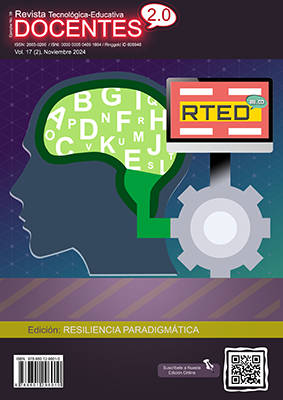The Impact of Artificial Intelligence on Teacher Training
 DOI:
https://doi.org/10.37843/rted.v17i2.566
DOI:
https://doi.org/10.37843/rted.v17i2.566
Main Article Content
Abstract
Artificial intelligence (AI) is advancing rapidly; based on the connectivity theory, a computer designed to interact with humanity solves certain tasks. The objective of the research was to analyze the impact of the application of artificial intelligence in teacher training. The research was framed in the cognitive paradigm, with a qualitative approach and a narrative design, through a documentary review and the PRISMA method. A search was conducted in various databases, and 11 relevant articles were selected. The results indicate that AI has the potential to improve teacher training by offering innovative tools and efficient pedagogical methods. Key dimensions such as cognitive, sensorimotor, emotional, and ethical demonstrate how AI facilitates autonomous learning, improves technical skills, and fosters interpersonal skills. However, limitations were evident, such as headteacher training's need for more training and resistance to new technologies. The study suggests that AI can enrich teacher training and improve educational quality, but current barriers must be addressed to maximize its impact. Furthermore, it is recommended to investigate how AI influences teacher training and to consider greater geographical diversity in future studies.
Downloads
Metrics
Article Details

This work is licensed under a Creative Commons Attribution-NonCommercial-NoDerivatives 4.0 International License.
Those authors who have publications in our journal accept the following terms:
- When a work is accepted for publication, the author retains rights of reproduction, distribution of his/her article for exploitation in all countries of the world in the format provided by our magazine and any other magnetic medium, optical, and digital.
- Authors will retain their copyright and guarantee the journal the right first to publish their work, which will be simultaneously subject to the Creative Commons Acknowledgment License (Attribution-NonCommercial-NoDerivatives 4.0 International (CC BY-NC-ND 4.0)). That allows third parties to copy and redistribute the material in any medium or format, under the following conditions: Acknowledgment - You must properly acknowledge authorship, provide a link to the license, and indicate if any changes have been made. You may do so in any reasonable way, but not in a way that suggests you have the licensor's endorsement or receive it for your use. NonCommercial - You may not use the material for a commercial purpose. NoDerivatives - If you remix, transform, or build from the material, you cannot broadcast the modified material. There are no additional restrictions - You cannot apply legal terms or technological measures that legally restrict you from doing what the license allows.
- Authors may adopt other non-exclusive license agreements to distribute the published version of the work (e.g., deposit it in an institutional archive or publish it in a monographic volume) provided that the initial publication in this journal is indicated.
- Authors are allowed and recommended to disseminate their work through the Internet (e.g., in institutional telematic archives, repositories, libraries, or their website), producing exciting exchanges and increasing the published work's citations.
- Request of withdrawal an article has to be done in writing by the author to the Editor, becoming effective after a written response from the Editor. For this purpose, the author or authors will send correspondence via e-mail: [email protected].
- The author will not receive financial compensation for the publication of his work.
- All Docentes 2.0 Journal publications are under the Open Journal System (OJS) platform at: https://ojs.docentes20.com/.
References
çAcosta Faneite, S. F. (2023). Los enfoques de investigación en las Ciencias Sociales. Revista Latinoamericana Ogmios, 3(8), 82–95. https://doi.org/10.53595/rlo.v3.i8.084 DOI: https://doi.org/10.53595/rlo.v3.i8.084
Adviser. (2021). Dramatized video-based problem-based learning (DVPL) in undergraduate medicine: An account of experience.
Del Campo, G., Villota, W., Andrade, E., Montero, Y. (2023). Análisis bibliométrico sobre estudios de la neurociencia, la inteligencia artificial y la robótica: énfasis en las tecnologías disruptivas en educación. Salud Ciencia y Tecnologia, 3(362). https:// doi.org/10.56294/saludcyt2023362
Hernández-Sampieri, R., Fernández-Collado, C., & Baptista-Lucio, P. (2014). Metodología de la investigación (6ta ed.). McGraw-Hill.
Hwang, G. J., & Chang, C. Y. (2023). A review of opportunities and challenges of chatbots in education. Interactive Learning Environments, 31(7), pp. 4099-4112. https:// doi.org/10.1080/10494820.2021.1952615 DOI: https://doi.org/10.1080/10494820.2021.1952615
Karsenti, T. (2019). Artificial intelligence in education: The urgent need to prepare teachers for tomorrow’s schools. Formation et Profession, 27(1), pp. 112 - 116. 10.18162/fp2019.a167 DOI: https://doi.org/10.18162/fp.2019.a166
Kinsner, W. (2023). Towards human security through personalized trans-disciplinary evolving symbiotic education based on cognitive digital twins. Cadmus, 5(2), 38-73. https://n9.cl/ho038
Mattar, J. (2018). Constructivism and connectivism in education technology: active, situated, authentic, experiential, and anchored learning. RIED - Revista Iberoamericana de Educación a Distancia, 21 (2), 201-217. http://dx.doi.org/10.5944/ried.21.2.20055] DOI: https://doi.org/10.5944/ried.21.2.20055
Mejía-Rivas, J. (2022). Los paradigmas en la investigación científica. Revista Ciencia Agraria, 1(3), 7-14. https://doi.org/10.35622/j.rca.2022.03.001 DOI: https://doi.org/10.35622/j.rca.2022.03.001
Owoc, M.L., Sawicka, A. & Weichbroth, P. (2021). Artificial Intelligence Technologies in Education: Benefits, Challenges and Strategies of Implementation. Springer International Publishing, pp. 37 - 58. https:// doi.org/10.1007/978-3-030-85001-2_4 DOI: https://doi.org/10.1007/978-3-030-85001-2_4
Page, M. J., Moher, D., Bossuyt, P. M., Boutron, I., Hoffmann, T. C., Mulrow, C. D., ... & McKenzie, J. E. (2021). PRISMA 2020 explanation and elaboration: updated guidance and exemplars for reporting systematic reviews. bmj, 372. https://doi.org/10.1136/bmj.n160 (BMJ) (BMJ DOI: https://doi.org/10.1136/bmj.n160
S?m?rescu, N., Bumbac, R., Zamfiroiu, A., & Iorgulescu, M. C. (2024). Artificial intelligence in education: Next-gen teacher perspectives. Amfiteatru Econ. J, 26. 145-161. https:// doi.org/10.24818/EA/2024/65/145 DOI: https://doi.org/10.24818/EA/2024/65/145
Tunjera, N. &. (2023). Investigating effective ways to use artificial intelligence in teacher education. Kidmore End: Academic Conferences International Limited. DOI: https://doi.org/10.34190/ecel.22.1.1625
Villasis, et al. (2020). Uso de revisiones sistemáticas y metaanálisis en la medicina basada en evidencia.
Wu, W., Burdina, G. & Gura, A. (2023). Use of artificial intelligence in teacher training. International. Journal of Web-Based Learning and Teaching Technologies, 18(1), pp. 1 - 15. https:// doi.org/10.4018/IJWLTT.331692 DOI: https://doi.org/10.4018/IJWLTT.331692
Yang, S., Ogata, H., Matsui, T. & Chen, N. (2021). Human-centered artificial intelligence in education: Seeing the invisible through the visible. Computers and Education: Artificial Intelligence, 2(100008). 10.1016/i.caeai.2021.100008 DOI: https://doi.org/10.1016/j.caeai.2021.100008






